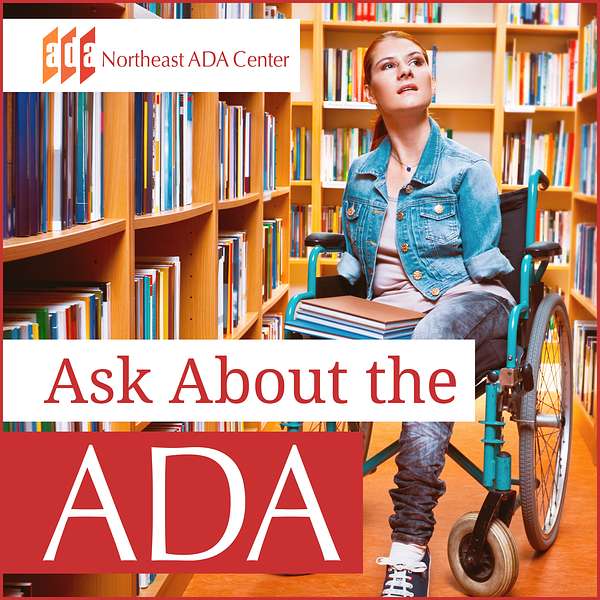
Ask About the ADA Podcast
The podcast answers frequently asked questions about the Americans with Disabilities Act and explores the rights and responsibilities of people with disabilities under the law.
Ask About the ADA Podcast
Ask About: Website Accessibility Under the ADA
•
Northeast ADA Center
•
Season 1
•
Episode 9
Does the Americans with Disabilities Act apply to websites? Must colleges provide virtual classes in an accessible format? This edition of Ask About the ADA is all about web accessibility requirements. For a transcript of today's episode, please visit the Ask About the ADA podcast feed on BuzzSprout.
Read more about the ADA and websites and virtual accessibility in education.
NortheastADA.org
JOE ZESSKI: Hello, and welcome to this edition of Ask About the ADA, the podcast where we answer your frequently asked questions about the Americans with Disabilities Act and how it applies to everyday life. On this edition, we have two web-related questions as the Americans with Disabilities Act applies to websites. So let's get into this very hot topic. Our first question is this. Does the ADA apply to websites? The answer is yes, but the particulars are a little bit tricky. First of all, let's look at titles II and III. Title II, of course, deals with state and local government and all the agencies that come out of those state and local governments Title III deals with businesses and nonprofits. In other words, the technical term is public accommodations. Under the regulations from the Department of Justice, for titles II and III, there are no specific standards defined in terms of websites. So this makes it a little bit tricky. However, the Department is held for many years that the ADA does, in fact, apply to websites. It's demonstrated this in a lot of ways. It has referred to web accessibility in a number of its settlement agreements with different businesses, or state, or county entities. And it's also shown it in some of its information that it has provided to the public. For example, in chapter 5 of the best practices toolkit for state and local governments, you can find information about website accessibility. And, in fact, it's touched on Title III and web accessibility fairly recently. In September of 2018, it sent a letter to Representative Ted Bud of North Carolina. In this letter, the Department of Justice affirmed that it's interpreted the Americans with Disabilities Act to apply to websites for over 20 years. The Department went on in this letter to say that even though there may not be specific regulations, that in itself is not a reason for a website to not be compliant with the ADA. In fact, the absence of regulations allows for flexibility in how a Title III entity chooses to comply with the general requirements of nondiscrimination. And for effective communication under the ADA, the Department went on to say that non-compliance with a voluntary technical standard for website accessibility in itself does not necessarily mean that a website is not compliant with the ADA. So, again, you really have to look very closely at each situation as you do with so many different aspects of the ADA. The long and the short of it is that, yes, the ADA does apply to websites, at least it is held to do so by the Department of Justice. However, there is some confusion around what standards apply and what qualifies as accessibility. Now let's look at our second question. And this deals with website accessibility in the education environment. Does an online college class have to be accessible? It's important to remember that students with disabilities must have an equal opportunity to access the services and activities of colleges and universities. Both the Department of Justice and the Department of Education recognize and enforce this equal opportunity. This enforcement comes under a couple of laws, the Americans with Disabilities Act and Section 504 of the Rehabilitation Act. Online learning accessibility means that a student, who has a visual disability or perhaps a reading disability, and who happens to be using a screen reader, which is a form of assistive technology, can read and effectively interact with an online learning management system, as well as the documents that a faculty member might provide to the class. It means that a student, who is deaf or hard of hearing, can access captions for videos and multimedia content. Basically, accessibility in the digital environment requires thoughtful planning and preparation on behalf of institutions, as well as faculty and how they will choose to deliver virtual learning. When taken together, the two questions that we touched on today tell us that website accessibility and in terms of its relations to the Americans with Disabilities Act takes a lot of thoughtful investigation and consideration. It's something that we know is very important, but we must think through how we will make a website accessible. If you want to find out more about this or about any other ADA related topic, please feel free to contact us at the Northeast ADA. You can call us at 1-800-949-4232. You can visit us on the web at northeast.ada.org. And, of course, you can email us at northeast.ada.cornell.adu. Feel free also to follow us on social media and interact with us. There you can follow us on Instagram, on Twitter, on Facebook, on LinkedIn. Just search for at Northeast ADA. And, of course, I must thank all those who helped to make this podcast possible. Thank you to Grace Fairchild, our producer and editor. Thank you as well to Peter Quinn of the YTI Media team for also editing the podcast and preparing it for publication. And thank you all for listening and being a part of our conversation. I'm Joe Zesski, program manager here at the Northeast ADA Center. Let's keep the conversation moving forward.